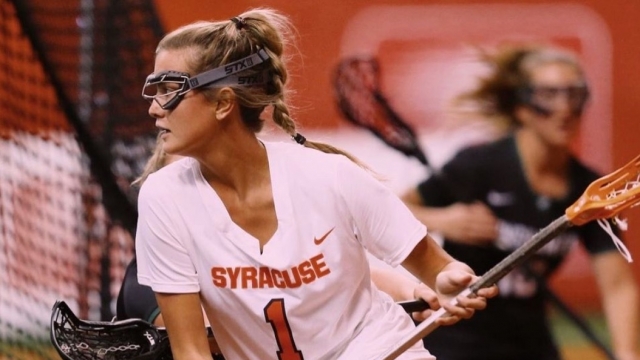Over the last few years, professional athletes have pulled back from a game or a competition and voiced their struggle with mental health. Brittney Griner was the latest to call a time out. For some, her announcement marks a step towards destigmatizing mental health in sports, but one expert explains female athletes tend to face additional pressure.
Morgan Alexander, a former Division I lacrosse player at Syracuse University, knows first-hand the personal pressure to preform college athletes face. She played lacrosse for six years in college and admits she didn't know she was struggling with her mental health until later in life. She believes as athletes step out of the spotlight and address mental health struggles, it can help younger players understand that they're not alone.
"Them coming forward has really just been, I think, really inspirational to a lot of kids that have been struggling, going through what they're going through," Alexander said.
Reactions to professional athletes taking time off is mixed and while there appear to be tending in a positive direction, Dr. Lindsey Mean, an associate professor in the school of Social and Behavioral Science at Arizona State University, says they can hurt female athletes by amplifying the pressure and expectations they already face.
"Just this idea that Britney is setting an example for those young girls is a really big, powerful pressure about being a role model, particularly as a female athlete, Mean said. "It comes with a lot of responsibility, and it's something that we don't see put on the male athletes in the same way."
Alexander says women playing college sports also struggle with their body image.
"Especially nowadays when you see social media and you see how girls look…an athlete is built very differently than an average person," Alexander said.
Alexander began playing lacrosse in second grade; she said by the time the was in the fifth grade, she knew her dream was to play lacrosse at Syracuse University.
"Lacrosse was my life, to me, it was my identity for so long," Alexander said.
SEE MORE: WNBA's Brittney Griner taking time off to focus on mental health
In 2015, Alexander stepped foot on the Syracuse University field, prepared to face-off against the best women's lacrosse teams, but a freshman year injury threatened her future in sports.
"I tweaked my knee and from there on out, it was just plagued with injuries," Alexander said. "I tore ACL, MCL, both meniscus in my right knee."
As the injures piled on, she felt the pressure to perform and the need to get out on the field. For six years, Alexander pushed her body to prove she was worthy of being part of the team.
"People see a physical injury and they're like, 'oh, wow, yeah, she tore ACL,' but no one knows that most [of] that physical injuries, [are] all mental," Alexander said.
She remembers fighting an internal battle and hiding it with her bubbly personality and her determination to play.
"I was feeling these emotions; I couldn't breathe, I went on anxiety medication," Alexander said.
SEE MORE: Equal pay in women's sports: The challenge for female athletes
An NCAA Student-Athlete Well-Being study released in 2022 found women in sports experienced higher rates of anxiety, mental exhaustion and sadness compared to men. The survey released was a follow-up to two studies conducted in 2020. The survey concluded that overall male and female student-athlete rates of mental exhaustion, anxiety and depression remained up to two times higher than before the COVID-19 pandemic.
Another report on the psychology of female athletes found that mental health disorders like anxiety, depression, and burnout increased the risk of injuries and impaired recovery.
"All athletes want to be the person who is picked by the coach to play," Mean said.
In 2022, three female college athletes took their lives within a two-month span. Their sudden deaths rocked the women's sports world, and some athletes called it "a crisis" and called on more resources and support. Nearly three years earlier, Morgan Rodgers, a lacrosse player at Duke University, ended her life. The college athlete spent a year trying to return to the field after a dream-shattering knee injury her sophomore season.
Rodgers' family started Morgan's Message, a nonprofit in her honor.
"We're trying to eliminate the stigma surrounding mental health and student athletes," Alexander said. "To help promote positive mental health and student athletes."
Alexander is now one of more than 3,500 ambassadors with Morgan's Message, helping guide student-athletes struggling with mental health. She says her experience and vulnerability help students understand they're not alone.
If you or anyone you know is experiencing suicidal thoughts you can call or text the 988 suicide and crisis lifeline for help.
Trending stories at Scrippsnews.com




